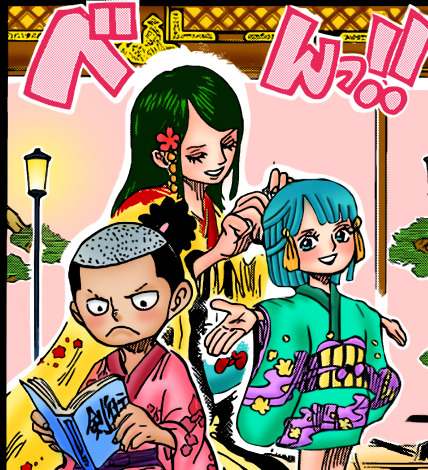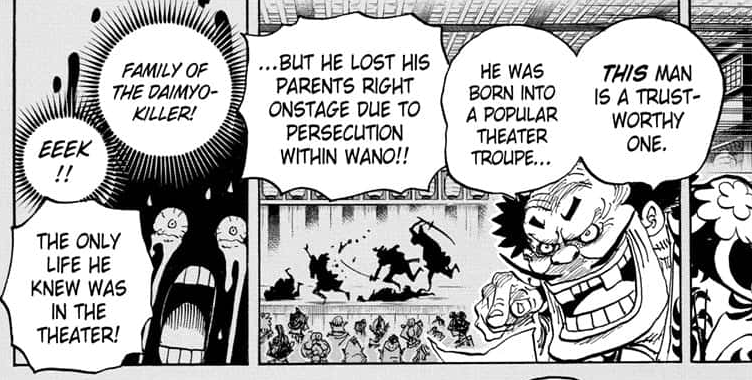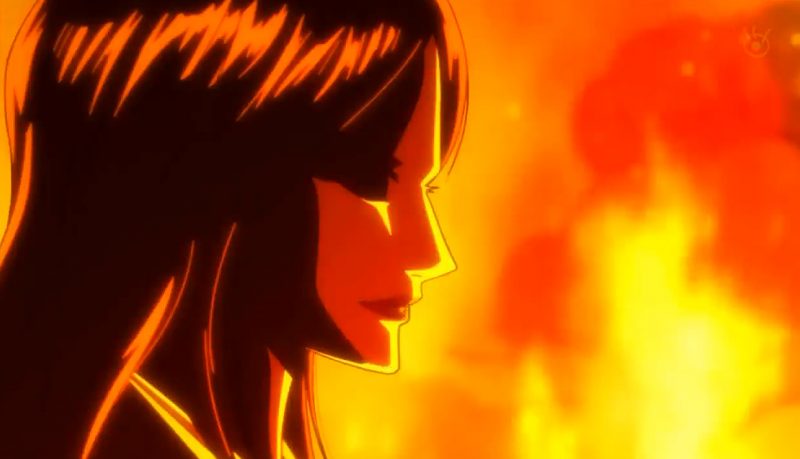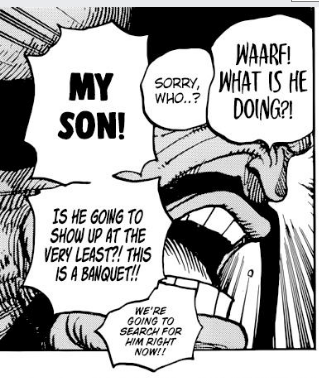I want to talk about a theme I see developing in the Wano Arc, which for lack of a better description, I’ll call “the burden of inherited will.”

Of course, throughout the series of One Piece we see many instances of “inherited will,” in which characters take up the most heartfelt dreams and desires of their parents, ancestors, and mentors. Often, it seems, this inheritance is accepted gratefully or with joy (archetypically, think of Luffy’s determined manly goodbye tears when he accepts Shanks’s hat).

It’s an honor for these characters (from their own point of view!) to carry out the dreams of their mentors and masters. Think of the Whitebeard Pirates resolving to protect Luffy at the end of the Marineford war. Think of Zoro deciding to be the greatest swordsman for the sake of himself and Kuina.

Think of the Fish-Men (especially Jinbe) taking on the dreams of Fisher Tiger and Otohime.

The point I’m trying to make is just that so far in One Piece, we’ve seen characters take on the will inherited from their forebears with grace, honor, and resolve. They have a generally positive attitude toward the whole situation, probably because they take carrying on a dream as a way for their mentor figure to live on through them. Inherited will, in short, has been seen as a positive force.

This attitude is in sharp contrast with some attitudes toward inheritance we’re seeing in the Wano Arc. In this arc, it seems, we’re finding that inherited will becomes a heavy burden for several characters. Characters break down and crack under the weight, or try to avoid the responsibility that comes with the inherited will altogether, or feel resentment for even having to take on the responsibility in the first place:
- Momonosuke feels pressured to take the role of his father, and moreover, to succeed where his father, a figure built up to be greater than great, has failed. He weeps from fear and from realizing his own weakness.

- Orochi is forced, from a very young age, to take on the responsibility of fulfilling the legacy of his grandfather, a man long dead. The jealous rage of his ancestors all but possesses him, he’s just a puppet of the machinations of dead men. This goes double for Kanjuro.

- Oden all but announces how suffocated his princely destiny makes him feel. He outwardly detests being burdened with responsibility, whether as shogun-in-waiting, daimyo, or division commander. Nevertheless, he feels compelled to take all these roles on, as they are inherited from people he respects and admires, and if not him, who? I’d argue that Oden’s five years of dancing are a kind of repenting for the sins of the people of Wano in killing the Kurozumi clan. He’s dancing to save them from the wrath of Orochi, sure, but more broadly, from the consequences of their own sins. Oden is a man willing to take on the burdens of others (literally!), even though he quite clearly hates it, and that’s of course what makes him so great.

- The Red Scabbards, especially Kin’emon, are shackled with Oden’s dream for the country of Wano. In the past few chapters, we see Kin’emon question his own judgment for the task, and all but give up before Kanjuro reveals himself as the traitor. Kin’emon buckles under the weight of the burden of his inheritance from Oden. The other scabbards are similarly burdened: Denjiro with two decades of silent rage, Ashura-doji with all-but-lost hope, Kawamatsu with a tragic feeling of failure. These are the burdens they must bear in order to see Oden’s dream through.

- Toki has sent herself through centuries compelled only to seek out her parents’ homeland. She knows that the true end of her journey in some sense ought to be 20 years in her future, that’s the true end of the will inherited from her origins in the Void Century, yet she seems to resent the very notion that she ought to do anything but be with Oden.

- Looking ahead, I wonder how Kaido’s son will fit into this theme. Will he too be forced to bear an inherited will which he doesn’t really want?

What these examples show, I think, is that inherited will isn’t always positive! It doesn’t always launch you into a life of adventure and joyous purpose. Sometimes it’s a malicious force that consumes your life with jealousy, rage, violence, despair, or resentment. It takes someone of truly great individual willpower, like Oden, to bear the weight of such things.
*Theory by toasted-toska


